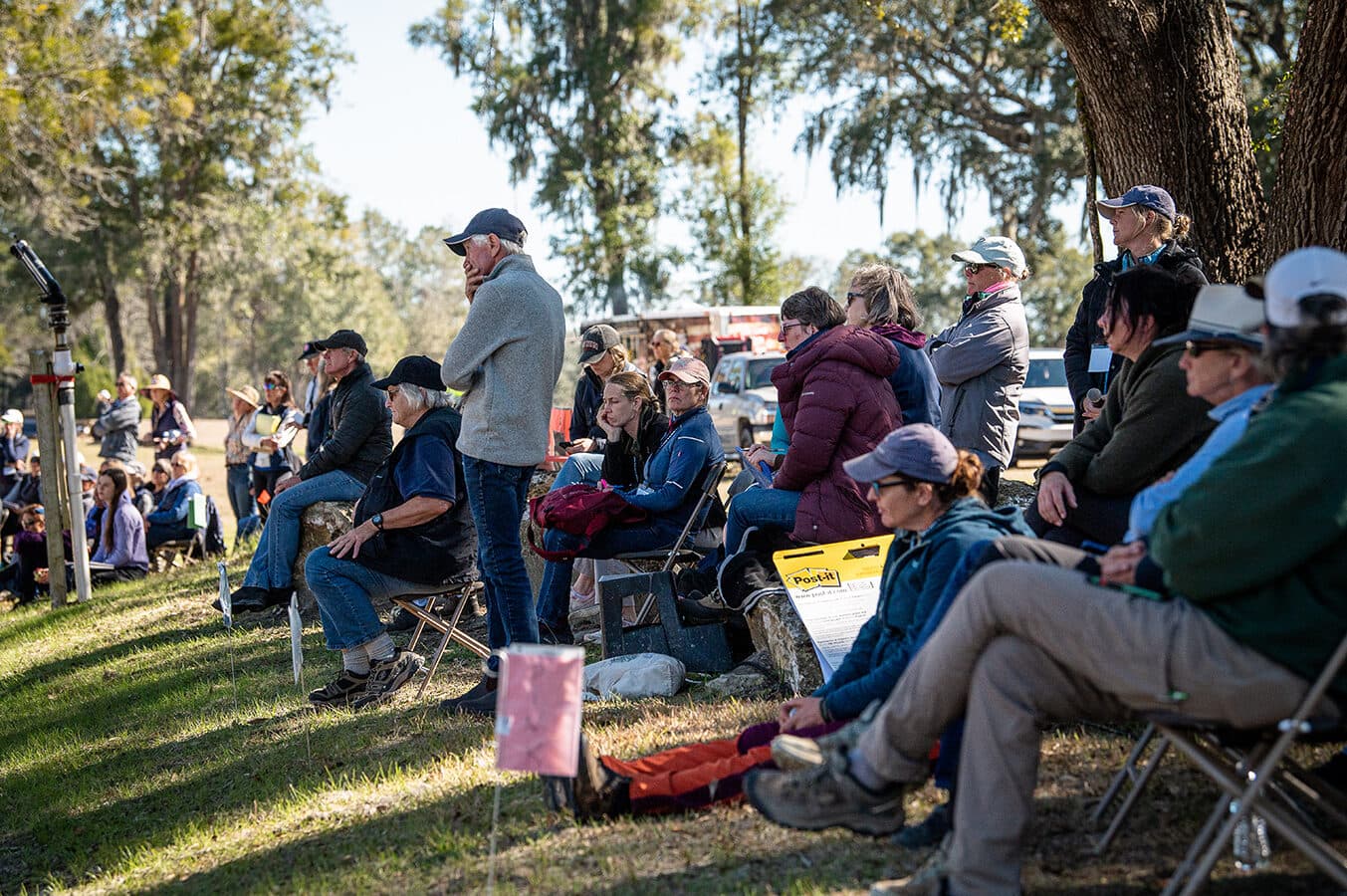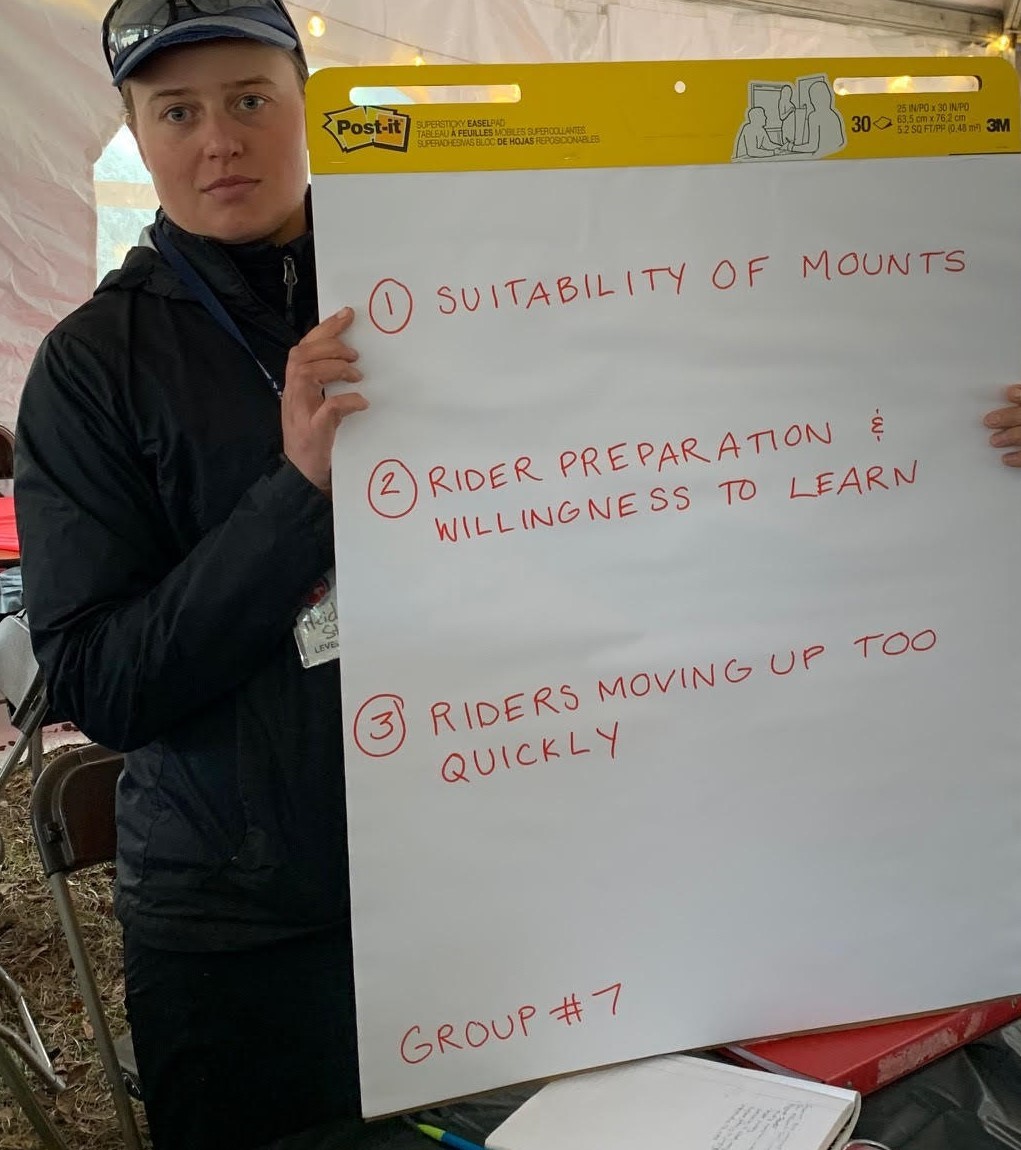The Round Table: Harnessing the Power of Experience

Putting 70-plus eventing coaches and instructors in a room and asking them to share their opinions and experiences could be considered the definition of organized chaos. But at the 2022 and 2023 Eventing Coaches Program (ECP) Educational Symposiums, the resulting thoughtful and creative discussion has become a popular educational segment of the symposium, the fruits of which will be helpful to coaches and students alike.
For the information of those who have not yet attended the newly formatted (new in 2022) ECP Educational Symposium, the attending coaches are engaged in an interactive program where they contribute to the discussion, and share their experience, as they develop teaching strategies with their group throughout the three-day program. The attendees are randomly divided into groups of 8-10 and assigned a color (blue group, white group, red group, etc.). This group becomes their working group for the entirety of the symposium. For every interactive activity, the groups are paired with an ECP Faculty member who serves as the moderator of the group discussion. The Faculty members are rotated from group to group for each new activity so that the attendees get to know the ECP Faculty and are exposed to various teaching styles and methods of communication throughout the event.

There is also a diversity of coaching experience in each group, from Level V coaches with a few elite athlete students to Introductory level instructors with large riding school programs, and everything in between. This format has made for informative discussion and problem solving with long term implications.
Since the new symposium format was initiated two years ago, the opening group activity on the first day has been the Round Table Discussion. Think of it as the “warm up round” for participants to get in the groove of working together as a group to discuss ideas and develop common strategies. Each group is given a giant flip chart and some colored markers to record their discussion and their resulting strategies.
In 2022, the question posed to the Round Table groups was:
“What are the three main issues facing instructors and coaches in modern eventing?”
As you might imagine, the discussion was lively and productive. Different issues and challenges were identified for different skill levels of riders, age groups, competition levels, varied horse ages/experiences, and support systems. Each group was asked to summarize their discussion in writing on their flip chart.
Remarkably, though the variables were many and diverse, the resulting concepts identified by each of the ten groups had universal themes which can be categorized under five general headings:
- Managing expectations, goal setting, student (and parent) understanding of the required commitment (financial, coaching support, and investment of time).
- Developing discipline and a commitment to learning, commitment to improving skills, and the degree of personal investment required when preparing for competition.
- Moving up the levels: Balancing safety, confidence, and the desire to move up the levels with the reality of a rider’s skill set, level of commitment or lack of same, and/or their horse’s capability.
- Strict adherence to correct fundamentals, developing the independent seat and aids, and systematic progression—only possible when the foundation is correct.
- Suitability of mounts: Appropriateness of the equine partners for riders’ skill sets, goals, and financial means.
In 2023, the Round Table challenge was built out from the 2022 discussion. Groups were asked to address the top issue identified by the 2022 Round Table session:
“Solve for: Managing Expectations. What are the top strategies for creating realistic expectations, goal setting, and measuring progression?”
The ensuing discussions really tapped into the creative juices of the attending coaches. We learned of many great practices already in use by both seasoned and younger instructors, and many concepts were expanded on to develop comprehensive strategies for students and coaches to employ in their programs and practice.
It is worth mentioning that every group referred to the “USEA Eventing Handbook by the Levels” as one of the most important resources available to coaches, students, and parents, particularly as a reference for setting and managing expectations.
At the conclusion of the discussion period, the top strategies put forward by the 10+ groups could be captured under four general headings:
- Communication
- Education
- Measurement of skills
- Training strategies
Communication strategies for effective horse and rider development
- Establish open and frequent lines of communication with students and with parents. Have an interview process for new students.
- Take the time to understand the dreams and expectations of the rider, and work to create a roadmap for achieving their vision. This roadmap should span an appropriate timeline; weeks, months, and years.
- Provide frank and honest current assessment of the student, their skill set, the suitability or limitations of mount, and safety concerns.
- Discuss in detail the level of commitment, time, and finances which will be required to achieve their long-term goals.
- Discuss in detail the requirements of preparing for and competing at the current and near-term competition levels. Include discussion of MERs, the limitations of linear measurements, and the value of maximum vs. minimum preparedness.
- Set short term, well-defined, measurable goals which encompass:
- Demonstrable, repeatable skills.
- Competition benchmarks as appropriate (must be consistent and repeatable).
- Commitment to learning, homework, practice.
- Set up progress and development meetings for periodic review:
- Require students to self-evaluate.
- Review goals, establish next steps.
- Provide post competition evaluation.
- Have students (and parents) sign off on goals, progress. Create a “Code of Conduct” which serves as a contract between the student and the coach, outlining some general expectations for practice, horse care, competition preparedness.
Education
- · The “USEA Eventing Handbook by the Levels” should be required reading.
- · Make sure riders are clear about the requirements at each competition level.
- · Establish clear requirements and timelines for preparing for each competition.
- · Be honest about the risks and safety concerns at each competition level.
- · Educate riders about the origins and history of the sport for a more thorough understanding of the sport.
Demonstration and measurement of skills
- · Skill benchmarks can be drawn directly from the Handbook or crafted uniquely for each individual horse/rider pair.
- · Required skills must be consistently demonstrated with repeatable results.
- Competition qualifications may be used as a measurement of level readiness in conjunction with demonstrable skill set, but as a secondary confirmation of skill.
- Create set lessons/sessions specifically to review required skills and to document progress.
Training and practice strategies to support goals
- Teach the theory for every new skill or exercise—students should know the “why”.
- Teach good horsemanship, horse management, and self-reliance.
- Utilize stand-alone dressage and jumper competitions, combined tests, and other types of events to prepare and measure progress.
- Generally, as a rule, train at home at one level above the current competition level for the dressage movements and show jumping heights. Conversely, train for the difficulty of the cross-country questions (striding, angles, etc.) at the height of a level below the current competition level.
- Teach the practical application of the required skills for use in daily training, and the value of their application in all three phases.
The ECP program is committed to developing world-class coaching for our sport. This development and certification of coaches includes the required knowledge of what to teach, which is the sum of a coach’s education and experience in the training of horses and teaching of riders. The ECP also acknowledges that great coaching must include the often-overlooked aspects of how to teach, how to communicate, and how to manage the student athletes, keep them safe, and help them set and achieve their goals. To this end the ECP continues to seek innovative means to bring increased knowledge to our eventing Coaches, and the ECP Educational Symposium is one such activity which is available to both certified and non-certified coaches, riders, students, and supporters.
Save the Date: The 2024 ECP Educational Symposium will be held Jan. 30, 31, and Feb. 1 at Barnstaple Eventing in Ocala, Florida.















